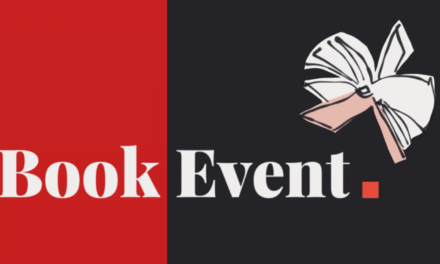Post 2 of 4: Star Encounters, Sibling Revelations, and a Bookish Surprise
There’s a certain unwritten rule when it comes to literary festivals: the bigger the name, the more carefully orchestrated the appearance. The star author swoops in, dazzles for an hour, signs books under tight security, and vanishes through a staff-only door.
So you can imagine my surprise when I discovered Lee Child—yes, that Lee Child—wasn’t just scheduled to appear at CrimeFest 2025. He was already on a panel the first day, casually, like it was the most normal thing in the world. No fanfare, no entourage. Just the man who created Jack Reacher, sitting down to talk books like the rest of us.
The Child Brothers: Casual Brilliance
Lee and his younger brother Andrew Child (who has taken over the reins of the Reacher novels) hosted a panel together that was easily one of the most anticipated sessions of the weekend. But rather than the polished, press-junket energy you might expect, it was deeply personal—two brothers talking shop in front of a crowd that adored them.
They spoke candidly about how their writing partnership works, what it’s like to carry forward a legacy without making it feel like a hand-me-down, and how their sibling bond fuels their creative process. There was real humor in the way they poked fun at each other – playfully wry bickering one moment, mutual respect the next.
There was one particular story that had the room laughing—a bit of Reacher-style logic applied to some real-life family friction. (Let’s just say: if you’re ever in a pub quiz with the Child brothers, back away slowly.)
And speaking of quizzes…
The Final Showdown: Trivia, Talent, and a Humble Giant
It’s said that a Reacher novel is sold every nine seconds. And yet somehow, Lee Child remains one of the most humble, approachable, and deeply present writers I’ve ever encountered.
He didn’t just show up for his panels and disappear. He stuck around. All weekend. He was often one of the last to leave. And even after most of the attendees had headed home on the final day, he showed up one last time – as team captain in the festival’s closing event: a crime fiction trivia battle between visiting authors and the festival organizers.
The organizers were formidable—walking encyclopedias of crime lit with a possibly unfair home-field advantage. Lee held his own, though, rattling off obscure facts and lesser-known book titles like it was second nature. His knowledge of writing trivia is, frankly, astonishing.
The organizers won (and I strongly suspect the questions were stacked in their favor), but no one seemed to mind. It was just one more way Lee Child showed up—not as a literary godhead, but as a man who clearly, deeply loves the world of books and writers. Captain of the trivia team on the very last day? That says everything.
Enter: Mark Gatiss (and a Surprise Hug)
If seeing Lee Child was surreal, meeting Mark Gatiss was something else entirely. I knew he’d be there to promote his new show, Bookish, but I didn’t expect to actually meet him—let alone have a moment I’ll probably be replaying for the rest of my life.
He impressed me immediately—not just because of who he is (actor, screenwriter, novelist, and half the creative force behind Sherlock and Inside No. 9)—but because of how present he was. He wasn’t scanning the room for someone more important. He wasn’t hurrying away from the fans. He was completely in the moment.
We exchanged a few words – just enough to mumble how much his work has meant to me – and then, unexpectedly, he hugged me. Just a warm, human, unscripted hug. I was stunned. And deeply touched, wishing I had the social dexterity to speak coherently with him, and without feeling like I might pass out.
Mark Gatiss wasn’t performative or “celebrity charming.” It felt sincere. And I know I wasn’t the only one—everyone who interacted with him came away a little bit glowy.
Bookish: A New Kind of Adaptation
Gatiss’s panel about Bookish was a fascinating peek behind the camera, but also before the camera ever got rolling. The character, the set-up – the entire show is entirely his own creation, and hearing him talk about it was a rare insight into how deeply personal projects come to life—and what it means to collaborate when those projects extend across media.
He wasn’t alone on stage. The author who’s been tasked with adapting Bookish from screen to page also joined the conversation. The two of them discussed what it’s like to move a story from one medium to another, and how you preserve voice and tone without making it feel like a simple transcription.
There was an unexpected honesty to the conversation—how difficult it is to translate mood and atmosphere from screen to page. They didn’t gloss over it or try to sell us something. They just told us the truth: adaptation is art, and it’s messy, and collaborative, and not always easy. Their second season was already green lit before the Pilot was aired.
Not Just Celebrities—Storytellers
What struck me most wasn’t the fame of the people I met. It was how down-to-earth, generous, and genuinely enthusiastic they were about the craft. These weren’t celebrities trying to move books or shows. They were writers talking about writing. Creators talking about what drives them. Siblings teasing each other in public. Storytellers letting us into their process.
And that hug? That hug is staying with me.


